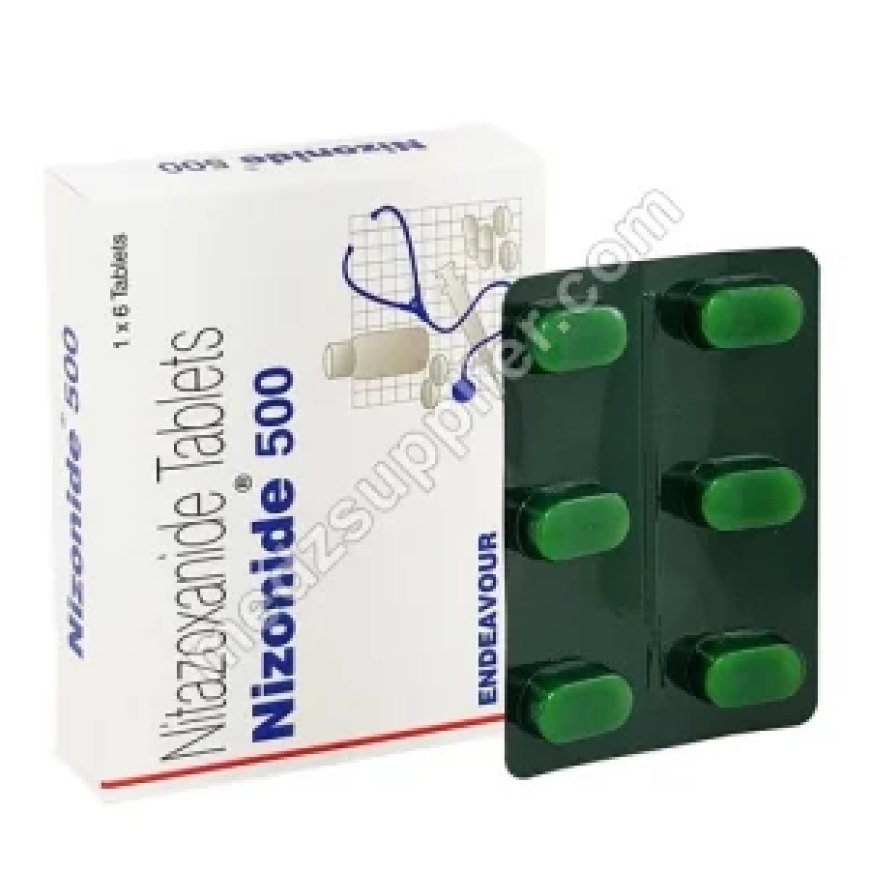Nizonide 500mg: An Instruction to Treatment For Worm Infection

Worm infections, also known as helminthic infections, are a common health issue affecting millions of people worldwide, particularly in tropical and subtropical regions. These infections are caused by parasitic worms, such as roundworms, hookworms, tapeworms, and others, which can invade the human body through contaminated food, water, or soil.
Once inside the body, these parasites can cause a range of symptoms, from mild discomfort to severe health complications. Nizonide 500mg (Nitazoxanide) is an effective antiparasitic medication widely prescribed for the treatment of various worm infections. This article provides an in-depth overview of Nizonide 500mg, its uses, mechanisms, dosage, side effects, and precautions to ensure its proper use for treating worm infections.
What Is Nizonide 500mg?
Nizonide 500mg contains Nitazoxanide, an antiparasitic and antiviral agent. Nitazoxanide is part of the thiazolide class of drugs and is well known for its broad-spectrum activity against protozoa and helminths (worms). Initially developed to combat parasitic infections, it has also shown effectiveness against viral infections, making it versatile in the medical field.
The key benefit of Nizonide lies in its ability to target both intestinal protozoa, such as Giardia lamblia and Entamoeba histolytica, and helminthic infections, such as those caused by Ascaris lumbricoides (roundworms) and Ancylostoma duodenale (hookworms).
How Does Nizonide 500mg Work?
Nitazoxanide, the active component of Nizonide, exerts its antiparasitic action by interfering with the energy production pathways of parasites. It specifically inhibits the enzyme pyruvate
oxidoreductase (PFOR), which is crucial for the energy metabolism of anaerobic organisms, such as protozoa and helminths. This disruption leads to the depletion of energy in the parasites, eventually killing them and preventing their replication.
Since Nizonide works by targeting the metabolic pathways unique to parasites, it leaves human cells relatively unaffected. This selective action makes it a safe and effective choice for treating worm infections without causing significant harm to the patient.
Uses of Nizonide 500mg
The nizonide 500mg is prescribed for the treatment of various parasitic infections, including
Giardiasis: Caused by the protozoan Giardia lamblia, which leads to gastrointestinal symptoms such as diarrhea, nausea, and abdominal pain.
Amebiasis: An infection caused by Entamoeba histolytica, resulting in symptoms like diarrhea, stomach cramps, and weight loss.
Helminthic infections: This includes infections caused by roundworms (Ascaris lumbricoides), hookworms (Ancylostoma duodenale), and whipworms (Trichuris trichiura).
Cryptosporidiosis: An intestinal infection caused by Cryptosporidium species, often seen in immunocompromised individuals like those with HIV/AIDS.
Other parasitic infections: It is also effective against other parasitic diseases as deemed necessary by healthcare professionals.
Dosage and Administration
The standard dosage of Nizonide for adults is 500mg twice a day, typically for a duration of 3 days. However, the exact dosage and duration of treatment may vary depending on the type and severity of the infection, the patient’s age, weight, and overall health status. It is essential to follow the prescribed dosage to ensure the effectiveness of the treatment.
For children, the dosage is usually adjusted based on body weight. Pediatric formulations or lower-strength tablets may be prescribed to ensure safe administration in younger patients.
Administration Guidelines:
Take the tablet orally with or without food.
It is advisable to take Nizonide at evenly spaced intervals for the entire duration of treatment to maintain steady levels of the medication in the bloodstream.
Complete the full course of treatment even if the symptoms improve before the end of the prescribed duration.
Side Effects of Nizonide 500mg
Like any medication, Nizonide may cause side effects, although not everyone experiences them. The side effects of Nizonide are generally mild and may include:
Nausea: Some patients may feel nauseous after taking Nizonide.
Vomiting: This is another common but temporary side effect.
Abdominal pain: Mild discomfort or cramping in the stomach area may occur.
Diarrhea: Though it treats infections causing diarrhea, it may also cause mild diarrhea in some individuals as a side effect.
Headache: A small number of patients report headaches while on Nizonide.
Dizziness: Feeling lightheaded or dizzy may occur in some cases.
These side effects are typically mild and resolve on their own without medical intervention. However, if the side effects persist or worsen, it is crucial to contact a healthcare provider for advice.
In rare cases, some individuals may experience more severe side effects, such as:
Allergic reactions, including rash, itching, swelling, severe dizziness, or trouble breathing. If any of these symptoms occur, seek emergency medical attention immediately.
Blood disorders, such as leukopenia (a decrease in white blood cells), though this is extremely rare.
Precautions and Warnings
Before taking Nizonide 500mg, consider the following precautions
Medical History
Inform your doctor of any existing medical conditions, especially liver or kidney disease, or a history of allergic reactions to Nitazoxanide or other medications.
Pregnancy and Breastfeeding: The safety of Nitazoxanide during pregnancy and breastfeeding is not well established. Pregnant or breastfeeding women should use this medication only if clearly needed and prescribed by a doctor.
Drug Interactions: Nizonide may interact with other medications, including anticoagulants (blood thinners) and immunosuppressants. It is important to inform the doctor of all medications and supplements currently being taken to avoid adverse drug interactions.
Driving and Operating Machinery: Since Nizonide can cause dizziness or drowsiness, avoid driving or operating heavy machinery until you are sure of how the medication affects you.
Alcohol: Avoid alcohol consumption while taking Nizonide, as it may worsen side effects like nausea and dizziness.
How to Store Nizonide 500mg
Store Nizonide tablets at room temperature, away from direct sunlight, moisture, and heat. Keep the medication out of reach of children and pets. Do not use Nizonide after the expiration date printed on the packaging.
Conclusion
Nizonide 500mg is a highly effective antiparasitic medication used to treat various parasitic infections, including worm infections. Its mechanism of action targets the energy production pathways of parasites, rendering them unable to survive and replicate. With its broad-spectrum activity, Nizonide is a preferred treatment option for many parasitic infections, particularly in regions where worm infections are prevalent.
While Nizonide is generally well-tolerated, it is essential to follow the prescribed dosage and be aware of potential side effects. By adhering to medical advice and taking necessary precautions, patients can safely and effectively use Nizonide to overcome parasitic infections and restore their health. If you experience any severe side effects or have concerns about the medication, consult your healthcare provider for further guidance.
What's Your Reaction?
























